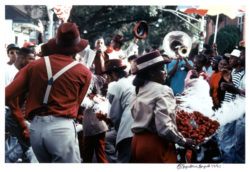NOLA 300 Music
I’ll Fly Away
The hymn “I’ll Fly Away” has long functioned as a signal of that transition from solemnity into celebration
Published: August 30, 2018
Last Updated: December 3, 2018
The hymn “I’ll Fly Away” has long functioned as a signal of that transition from solemnity into celebration. And though it appears in second lines, on stages, and in brass and traditional jazz band recordings today, it was confined to the funeral repertoire for many decades.
The reason for its move seems essentially tied to that nexus of sacred and secular, personal and communal meanings the song has come to occupy. The lyrics promise a release from the burden of life’s “shackles” and “shadows” and entry into a “land where joy shall never end,” against the backdrop of a soaring and jubilant melody, giving listeners (and in the case of a jazz funeral, those who sing along and dance) a sense of hope for the soul of the person who has died.
Generations of New Orleanians have heard, sung, and performed the hymn during that charged moment at funerals when the music shifts tempo and feel. Those memories get passed down within families, between musicians and among second line participants, adding weight to the song’s meaning until it becomes as much about sharing certain feelings as it is about the spiritual transition from life into afterlife.
It doesn’t hurt that its structure feels almost tailor-made for traditional New Orleans jazz.
“It’s a simple hymn that has a simple harmonic structure that uses chords that are familiar in hymns and jazz songs,” says Dr. Michael White. “And the melody leaves the right amount of space for collective improvisation and also for putting New Orleans type beats or rhythms behind it.”
Often mistaken for an African-American spiritual, “I’ll Fly Away” was actually written in 1929 by Albert E. Brumley, a white songwriter based in rural Oklahoma. After the Hartford Music Company published it in 1932, the song quickly became a favorite at shape-note singing conventions. By the time the then Brooklyn-based gospel group the Selah Jubilee Singers cut their popular version of the tune in 1941, it had already spread to African-American communities throughout the south, according to Kevin Donald Kehrberg, whose 2010 University of Kentucky dissertation points out that Reverend J. M. Gates, a black preacher based in Atlanta, recorded the first known commercial version of the song in 1940.
White suspects the Olympia Brass Band may have introduced “I’ll Fly Away” into the traditional jazz repertoire in New Orleans in the 1970s or ’80s. Preservation Hall’s Ben Jaffe, who grew up hearing his father, Allan, play with the Olympia when it was led by Ben’s godfather, Harold Dejan, didn’t register the song as anything more than “part of the funeral repertoire” until even more recently.
“For me, it took on a whole new importance post-Katrina, when for the first time I started hearing younger bands like the Hot 8 [Brass Band] playing it,” Jaffe recalls. “It became almost like a battle cry, like a badge of honor. . . . It was one of those songs that all of a sudden identified us as like New Orleanians. . . . When the band would break into it, everybody knew the words, everybody felt like a sense of identity, a sense of community, a sense of place.”
At the same time, the song’s funereal element remained intact even as it transitioned out of church services and jazz funerals.
When Jaffe noticed the Hot 8 was playing the song in unexpected settings, it had only been a year or so since the band was devastated by the 2004 death of their trombonist, Joe Williams. The unarmed twenty-two-year-old African-American musician and former member of the Stooges Brass Band was shot and killed by police in the Tremé.
“The first time I heard ‘Fly Away’ and really felt it was at the funeral for Joe Williams,” says TBC Brass Band trombonist Edward Jackson. As a representative of the “younger brass band” community Jaffe referenced, Jackson points to another reason musicians may have played “I’ll Fly Away” outside of funeral settings in the years following the storm.
“A lot of musicians were comin’ up as they passed [at that time] and everybody didn’t get the send-off they deserve,” he explains. “So the next time we would get a chance to dedicate something to that person . . . we would play it . . . regardless of where.”
Jackson played it for his own fallen bandmate, saxophonist Brandon Franklin, who was killed in a domestic dispute on Mother’s Day in 2010.
Asked if TBC ever recorded “I’ll Fly Away,” Jackson cited a recent mixtape.
“We did that for Brandon,” he said.
Jennifer Odell covers New Orleans jazz and brass band music for Downbeat, Jazz Times, Offbeat, and Gambit and serves as the Special Events Director for her proudly irreverent Mardi Gras dance troupe, the Camel Toe Lady Steppers.
